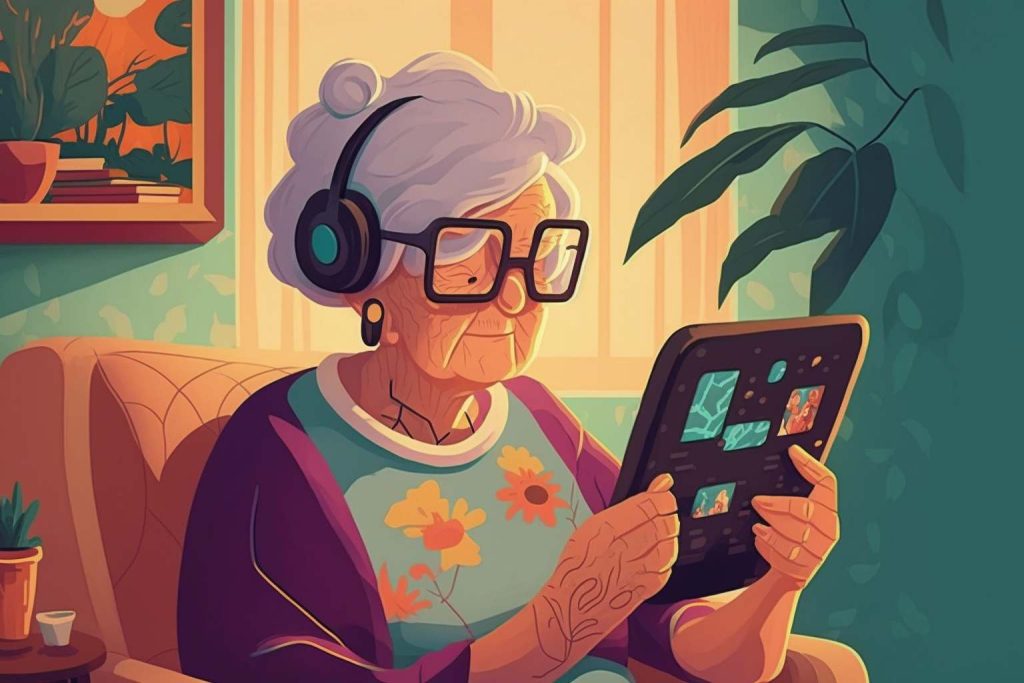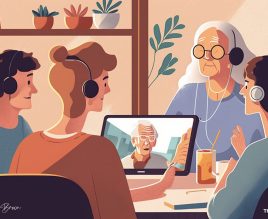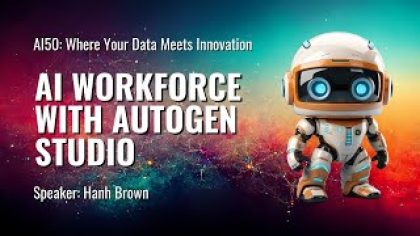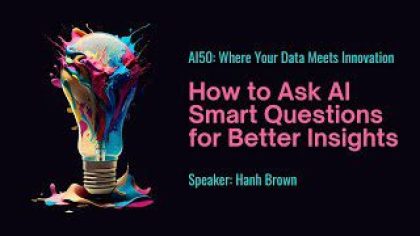Table of Contents
ToggleSocial isolation and loneliness are two growing concerns for seniors, particularly as the global population ages. With advancements in technology, artificial intelligence (AI) has been seen as a promising solution to address these issues. AI-driven solutions, like AI companions, have been developed to provide support and companionship to the elderly. However, there is a paradoxical effect: while AI may help combat social isolation, it could also inadvertently foster loneliness among seniors. In this article, we will explore the role of AI in both alleviating and exacerbating loneliness and consider the implications for elder care and mental health.
AI-driven solutions have been developed to assist seniors in various ways, from monitoring their health to offering cognitive stimulation. Some AI companions, like CareCoach’s GeriJoy, provide a virtual pet for seniors to interact with, while others, like ElliQ, engage users in conversation and offer personalized suggestions. These AI-driven tools can help seniors maintain social connections, improving their mental health and overall well-being.
By offering companionship and social interaction, AI can play a crucial role in improving senior mental health. Studies have shown that social engagement and cognitive stimulation contribute to better cognitive health among older adults. AI companions can offer regular interaction, reducing feelings of isolation and potentially preventing cognitive decline.
While AI companions offer a form of social interaction, they may not provide the depth of human connection that seniors need. The lack of genuine empathy and understanding from AI can leave seniors feeling empty and unfulfilled. Additionally, reliance on AI companions may inadvertently cause seniors to withdraw from human relationships, leading to increased loneliness.
AI-driven Solutions for Combating Social Isolation
In the quest to combat social isolation among seniors, a variety of AI-driven solutions have emerged. These innovative technologies range from AI companions and social robots to AI-powered communication platforms. By exploring the features and benefits of these solutions, we can better understand their potential in addressing social isolation.
AI Companions and Social Robots
AI companions and social robots are designed to interact with seniors, providing a form of companionship and mental stimulation. These solutions often come in various forms, such as virtual pets or humanoid robots. And it can engage seniors in conversation, offer reminders for daily tasks, and provide entertainment.
One example of an AI companion is CareCoach’s GeriJoy, a virtual pet that seniors can interact with via a tablet. The pet responds to touch and voice, providing comfort and companionship. Another example is the humanoid robot, Pepper, which uses AI algorithms to recognize and respond to human emotions. It can engage in conversation, dance, and even lead exercise routines, offering a more interactive experience for seniors.
The primary benefit of AI companions and social robots is their ability to provide social interaction for seniors who may otherwise be isolated. This interaction can help improve seniors’ mental well-being and cognitive function, and potentially reduce feelings of loneliness.
AI-powered Communication Platforms
AI-powered communication platforms are another innovative solution to help seniors maintain social connections and combat isolation. These platforms often leverage AI algorithms to facilitate communication with family, friends, and caregivers. Making it easier for seniors to stay connected.
One example is the AI-driven platform, Komp, which uses a simple one-button interface to help seniors easily video call their loved ones. The platform is designed specifically for older adults who may have limited experience with technology, removing barriers to communication.
Also read: AI in Dementia Care: Balancing Potential, Innovation Meets Compassion
Another example is the AI-powered app, Oscar Senior. Which not only allows seniors to video call and message their family and friends. But also provides personalized content, such as news articles and games, based on the user’s interests. This app can also help seniors manage their daily tasks and medication reminders. Offering a more comprehensive solution for staying connected and engaged.
AI-powered communication platforms have the potential to address social isolation. By making it easier for seniors to maintain connections with their social network. By providing user-friendly interfaces and personalized content. These platforms can help seniors feel more connected and engaged, ultimately reducing feelings of loneliness and isolation.
AI’s Role in Mental Health Care for Seniors

As the global population ages, the need for effective mental health care for seniors becomes increasingly important. Artificial intelligence has the potential to play a significant role in this area, offering innovative solutions for mental health assessment and support. In this section, we will explore the ways AI-driven tools can be used to enhance mental health care for seniors.
AI-driven Mental Health Assessment
AI-driven mental health assessment tools have the potential to revolutionize the way. We diagnose and monitor mental health conditions in seniors. By leveraging AI algorithms and data analysis. These tools can provide more accurate and timely assessments, leading to better treatment plans and outcomes.
For example, researchers have developed AI algorithms that can analyze speech patterns to identify signs of depression or cognitive decline in older adults. These algorithms can detect subtle changes in speech, such as pauses or shifts in tone, which may be indicative of mental health issues. This allows for early intervention and ongoing monitoring of seniors’ mental health.
Another example is the use of AI in analyzing seniors’ behavior and daily routines through smart home technology. By monitoring patterns of activity, AI can identify changes that may signal a decline in mental health or the onset of cognitive issues. This early detection can help seniors and their caregivers to take action and seek appropriate support.
AI-powered Interventions and Support
AI-powered interventions and support tools can offer seniors personalized and accessible mental health care. These solutions often use AI algorithms to tailor interventions based on individual needs and preferences, providing seniors with targeted support to improve their mental well-being.
One such example is the use of AI-driven chatbots for mental health support. These chatbots can engage seniors in conversation, provide coping strategies, and offer resources for managing mental health concerns. By offering immediate and personalized support, AI-driven chatbots can help seniors feel less isolated and more empowered to manage their mental health.
Another example is the use of AI in cognitive training programs, such as BrainHQ. Which are designed to improve cognitive function and reduce the risk of cognitive decline in older adults. These programs use AI algorithms to adapt the level of difficulty and the type of cognitive tasks based on the user’s performance. Ensuring that seniors receive targeted and effective training.
AI has the potential to play a crucial role in the mental health care of seniors, offering innovative solutions for assessment, intervention, and support. By leveraging the power of AI, we can provide seniors with more accurate, personalized, and accessible mental health care, ultimately improving their overall well-being.
The Benefits of AI in Fighting Social Isolation Among Seniors
The use of artificial intelligence in combating social isolation among seniors offers numerous benefits. Including increased access to socialization opportunities, enhanced support for mental health, and personalized, adaptive care. In this section, we will delve into these advantages and explore how AI can positively impact seniors’ lives.
Increased Access to Socialization Opportunities

AI-driven solutions, such as AI companions and communication platforms, can significantly increase seniors’ access to socialization opportunities. These technologies provide user-friendly interfaces and engaging experiences that can help seniors stay connected with others and maintain social connections, even when face-to-face interaction is limited.
For instance, AI companions like GeriJoy’s virtual pet and Pepper, the humanoid robot, can engage seniors in conversation, provide entertainment, and offer companionship. These AI-driven companions can fill the void of social interaction for seniors who may be isolated due to mobility issues, distance from family and friends, or a lack of social support.
Similarly, AI-powered communication platforms like Komp and Oscar Senior facilitate communication between seniors and their loved ones. By offering simple, accessible interfaces, these platforms remove barriers to communication and enable seniors to maintain connections with their social network more easily. This increased access to social interaction can help reduce feelings of isolation and loneliness among seniors.
Enhanced Support for Mental Health
AI-driven solutions can also provide enhanced support for seniors’ mental health by offering personalized and accessible mental health care. AI-driven mental health assessment tools, such as those that analyze speech patterns and daily routines, can provide early detection of mental health issues and enable timely interventions.
AI-powered interventions, like chatbots and cognitive training programs, offer personalized and targeted mental health support. Chatbots can engage seniors in conversation, provide coping strategies, and offer resources for managing mental health concerns. While cognitive training programs like BrainHQ can help seniors maintain cognitive function and reduce the risk of cognitive decline.
By offering immediate and personalized support, AI-driven tools can help seniors feel less isolated and more empowered to manage their mental health. This enhanced support can lead to improved mental well-being and a better quality of life for seniors.
Personalized and Adaptive Care
One of the most significant advantages of AI-driven solutions in combating social isolation among seniors is their ability to provide personalized and adaptive care. AI algorithms can analyze individual preferences, needs, and performance to tailor interventions and support, ensuring that seniors receive the most effective care possible.
For example, AI-powered communication platforms like Oscar Senior can provide personalized content based on the user’s interests, offering a more engaging and customized experience. Cognitive training programs like BrainHQ can adapt the level of difficulty and type of cognitive tasks based on the user’s performance, ensuring that seniors receive targeted and effective training.
Additionally, AI-driven mental health assessment tools can monitor seniors’ mental health and identify changes in behavior, speech, or daily routines that may signal a decline in mental health or the onset of cognitive issues. This early detection can help seniors and their caregivers adapt care plans to address evolving needs and preferences.
AI-driven solutions offer numerous benefits in the fight against social isolation among seniors. By providing increased access to socialization opportunities, enhanced support for mental health, and personalized, adaptive care, AI has the potential to significantly improve seniors’ well-being and quality of life.
The Risks and Challenges of AI in Addressing Loneliness Among Seniors
While AI-driven solutions offer numerous benefits in combating social isolation and loneliness among seniors, there are also risks and challenges that must be considered. In this section, we will explore the potential loss of human connection, the dangers of overreliance on AI companions, and the privacy and ethical concerns associated with using AI in addressing loneliness among seniors.
The Loss of Human Connection

One of the most significant challenges associated with using AI to address loneliness among seniors is the potential loss of human connection. Genuine human interaction is essential for emotional well-being, and AI-driven companions or communication platforms may not fully replicate the depth and quality of human connections.
AI companions, for example, can provide a form of social interaction, but they lack the genuine empathy and understanding that humans can offer. This can result in seniors feeling unfulfilled and still experiencing loneliness despite having an AI companion. Face-to-face interactions, physical touch, and shared experiences are essential aspects of human connection that AI-driven solutions cannot fully provide.
Additionally, the use of AI-driven communication platforms may inadvertently contribute to a decrease in face-to-face interactions with friends and family, as seniors may rely more heavily on these platforms for social interaction. This reliance can lead to a more isolated and disconnected experience for seniors, exacerbating feelings of loneliness.
Overreliance on AI Companions
Another risk associated with using AI to address loneliness among seniors is the potential for overreliance on AI companions. While AI companions can provide social interaction and support, becoming overly dependent on them may inadvertently cause seniors to withdraw from human relationships.
This overreliance can be detrimental to seniors’ emotional well-being, as it may lead to increased feelings of isolation and loneliness. To mitigate this risk, it is essential to strike a balance between using AI companions and maintaining genuine human connections. Caregivers, family members, and communities must focus on creating opportunities for seniors to engage with others and maintain meaningful relationships. Ensuring they do not become overly reliant on AI companions for social interaction.
Privacy and Ethical Concerns
The use of AI-driven solutions in addressing loneliness among seniors also raises privacy and ethical concerns. AI algorithms and data analysis are integral to many AI-driven solutions, which may involve collecting and processing sensitive information about seniors’ behaviors, preferences, and mental health.
This data collection raises concerns about seniors’ privacy and the potential misuse of their information. Ensuring that AI-driven solutions adhere to strict privacy regulations and data protection standards is crucial to addressing these concerns and maintaining seniors’ trust in the technology.
Moreover, ethical concerns may arise regarding the potential for AI companions to manipulate seniors’ emotions or deceive them into believing they are interacting with a human. Establishing clear guidelines and ethical standards for AI-driven solutions is necessary to ensure they are used responsibly and in the best interests of seniors.
While AI offers promising solutions to address social isolation and loneliness among seniors, it is essential to consider the risks and challenges associated with its use. By acknowledging the potential loss of human connection, the dangers of overreliance on AI companions, and the privacy and ethical concerns. We can work towards responsible and balanced integration of AI in addressing loneliness among seniors.
Recommendations for Harnessing AI’s Potential in Senior Care
To harness the potential of AI in senior care while addressing the risks and challenges, it is essential to adopt a balanced and collaborative approach. In this section, we will discuss recommendations for fostering a balanced approach between AI and human care. Encouraging collaboration among AI developers, government, and senior care organizations, and promoting digital literacy and accessibility among seniors.
Fostering a Balanced Approach Between AI and Human Care
A balanced approach between AI and human care is crucial to ensure seniors benefit from AI-driven solutions without sacrificing genuine human connection. This involves integrating AI companions and communication platforms as supplementary tools rather than replacing human care.
Caregivers, family members, and senior care organizations should focus on providing seniors with opportunities for meaningful human interaction. While utilizing AI-driven solutions to enhance their support. This approach will help ensure seniors maintain vital connections with others. Mitigating the risks of overreliance on AI companions and loss of human connection.
Encouraging Collaboration Between AI Developers, Government, and Senior Care Organizations
Collaboration among AI developers, government, and senior care organizations is key to ensuring AI-driven solutions effectively address seniors’ needs and adhere to ethical standards. By working together, these stakeholders can identify areas where AI can have the most significant impact . And develop solutions that are tailored to seniors’ unique needs and preferences.
Government and regulatory bodies can help establish guidelines and ethical standards to address privacy concerns and ensure responsible use of AI in senior care. Furthermore, collaboration will facilitate the development of policies and incentives to promote AI-driven innovation and its integration into senior care services.
Promoting Digital Literacy and Accessibility Among Seniors
To maximize the benefits of AI-driven solutions, it is crucial to promote digital literacy and accessibility among seniors. This involves offering training programs and resources to help seniors become more comfortable with technology and AI-driven solutions.
Senior care organizations, community centers, and libraries can play a significant role in providing these resources and fostering digital literacy among seniors. Additionally, AI developers should prioritize user-friendly interfaces and designs that cater to seniors’ specific needs and abilities.
By promoting digital literacy and accessibility, seniors will be better equipped to utilize AI-driven solutions. And take advantage of the socialization opportunities and mental health support they offer.
Adopting a balanced approach between AI and human care, encouraging collaboration among stakeholders. And promoting digital literacy and accessibility will help harness AI’s potential in senior care. By following these recommendations, we can work towards a future where AI-driven solutions enhance seniors’ well-being. While preserving the importance of human connection.
FAQs
How can AI help reduce social isolation among seniors?
AI can help reduce social isolation among seniors by providing AI companions that engage in conversation, offer entertainment, and provide companionship. Additionally, AI-powered communication platforms can facilitate easier communication between seniors and their loved ones. Helping them stay connected and maintain social interactions.
What are the benefits of using AI in senior care?
Benefits of using AI in senior care include increased access to socialization opportunities. Enhanced support for mental health, personalized and adaptive care, and early detection of mental health issues. These benefits can lead to improved well-being and a better quality of life for seniors.
Can AI companions replace human interaction?
AI companions can provide a form of social interaction. But they cannot fully replicate the depth and quality of genuine human connections. It is important to maintain a balance between utilizing. AI-driven solutions and fostering meaningful human interactions to ensure seniors’ emotional well-being.
What are some challenges associated with using AI to address loneliness among seniors?
Challenges associated with using AI to address loneliness among seniors include the potential loss of human connection. The risk of overreliance on AI companions, and privacy and ethical concerns related to the collection and use of sensitive information about seniors.
How can we ensure AI-driven solutions are used responsibly in senior care?
To ensure AI-driven solutions are used responsibly in senior care. It is essential to foster collaboration among AI developers, government, and senior care organizations. This collaboration can help establish guidelines, ethical standards, and best practices for the responsible use of AI in senior care.
References
- https://www.ncbi.nlm.nih.gov
- https://www.digitalhumans.com
- https://www.npr.org/
- https://www.europarl.europa.eu/

















